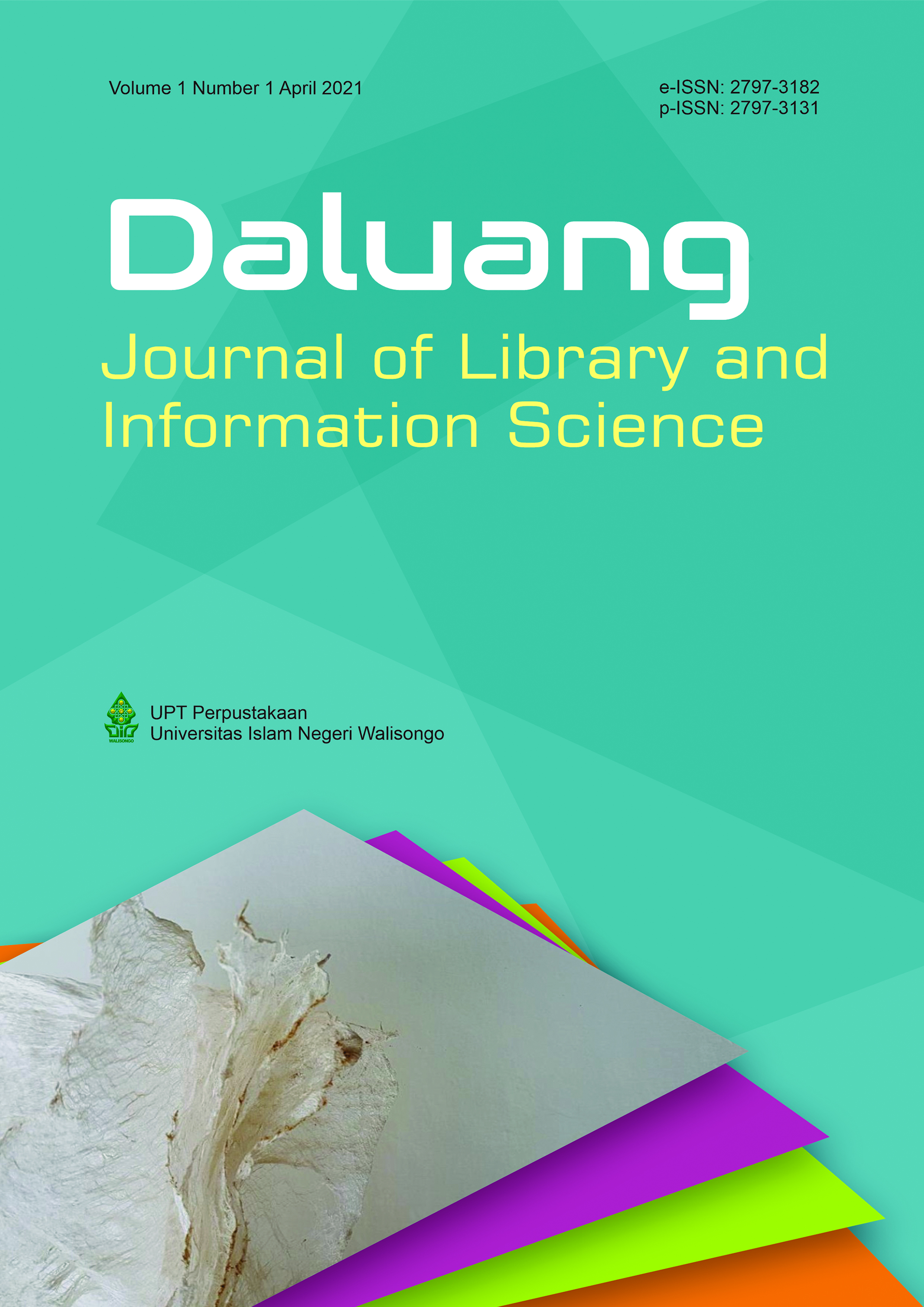Kompetensi Pustakawan di Era Industri 4.0 dalam Menghadapi Information Overload
Main Article Content
Abstract
Introduction: The phenomenon of information overload experienced by the Indonesian people has caused many problems ranging from a decrease in the level of public awareness in understanding the validity and accuracy of information sources to changes in public information behavior. One of the problems in the flood of information is the increase of publications both scientific and popular which are the daily consumption of society which is very relevant to the librarian in the current situation and in the future.
Methodology: This research was conducted qualitatively by collecting data from literatures that relevant to the research theme. The collected data was then identified to find patterns that match the research objectives, namely to find out the competence of librarians that is relevant for the industrial era 4.0.
Discussion: The results show librarians need to have strategies in developing new ways to help people direct and focus their search for finding documents or information that are accurate and valid.
Conclusion: It is known that the information overload phenomenon is one of the hallmarks of this industrial 4.0 era so that it requires the development of librarian competencies in maintaining their contribution and existence in the information society.
Downloads
Article Details
This work is licensed under a Creative Commons Attribution-NonCommercial-NoDerivatives 4.0 International License.
Articles published in Daluang Journal of Library and information Science are available under Creative Commons Attribution Non-Commercial No Derivatives Licence (CC BY-NC-ND 4.0). Authors retain copyright in their work and grant Daluang Journal of Library and information Science right of first publication under CC BY-NC-ND 4.0. Users have the right to read, download, copy, distribute, print, search, or link to the full texts of articles in this journal, and to use them for any other lawful purpose.
Articles published in Daluang Journal of Library and information Science can be copied, communicated and shared in their published form for non-commercial purposes provided full attribution is given to the author and the journal. Authors are able to enter into separate, additional contractual arrangements for the non-exclusive distribution of the journal's published version of the work (e.g., post it to an institutional repository or publish it in a book), with an acknowledgment of its initial publication in this journal.
This copyright notice applies to articles published in Daluang Journal of Library and information Science volumes 1 onwards.
References
Allen, D., & Wilson, T. D. (2003). Information overload: context and causes. The New Review of Information Behaviour Research, 4(1), 31–44. https://doi.org/10.1080/14716310310001631426
Anunobi, C. V., & Udem, O. K. (2014). Information Literacy Competencies: A Conceptual Analysis. Journal of Applied Information Science and Technology, 7(2). https://doi.org/10.31229/osf.io/bsza6
Erboz, G. (2017). How To Define Industry 4.0: Main Pillars Of Industry 4.0. In I. Košičiarová & Z. Kádeková (Ed.), International scientifis conference Managerial trends in the development of enterprises in globalization era (hal. 761–767). Faculty of Economics and Management, Slovak University of Agriculture in Nitra. https://www.researchgate.net/publication/326557388_How_To_Define_Industry_40_Main_Pillars_Of_Industry_40
Hasbana, A. (2017). Standar kompetensi pustakawan sebagai instrumen asesmen jabatan fungsional pustakawan. AL-MAKTABAH, 16(1). http://journal.uinjkt.ac.id/index.php/al-maktabah/article/view/8090
Heriyanto, H. (2020). Preferensi penggunaan sumber informasi oleh mahasiswa dalam menyelesaikan tugas kuliah. Jurnal Kajian Informasi & Perpustakaan, 8(1), 35–48. https://doi.org/10.24198/jkip.v8i1.23440
Hermann, M., Pentek, T., & Otto, B. (2015). Design Principles for Industrie 4.0 Scenarios: A Literature Review. In Technische Universitat Dortmund (No. 01). https://www.researchgate.net/profile/Mario-Hermann-2/publication/307864150_Design_Principles_for_Industrie_40_Scenarios_A_Literature_Review/links/57cfd2fb08aed6789701cbeb/Design-Principles-for-Industrie-40-Scenarios-A-Literature-Review.pdf
Heylighen, F. (1999, Februari 19). Change and Information Overload: negative effects. http://pespmc1.vub.ac.be/CHINNEG.html
Hopkins, R. L. (1995). Countering information overload: The role of the librarian. Reference Librarian, 23(49–50), 305–333. https://doi.org/10.1080/J120v23n49_21
Huvila, I., Holmberg, K., Kronqvist-Berg, M., Nivakoski, O., & Widén, G. (2013). What is Librarian 2.0 - New competencies or interactive relations? A library professional viewpoint. Journal of Librarianship and Information Science, 45(3), 198–205. https://doi.org/10.1177/0961000613477122
Jackson, T. W., & Farzaneh, P. (2012). Theory-based model of factors affecting information overload. International Journal of Information Management, 32(6), 523–532. https://doi.org/10.1016/j.ijinfomgt.2012.04.006
Kurniasih, N. (2015). Kualifikasi Pustakawan di Era Digital. In Sulistyo Basuki, Laksmi, Laksmi Dewi, Riche Cynthia, & Pawit M. Yusuf (Ed.), Semiloka Nasional Kepustakawanan Indonesia “Library Move on: Bangga Menjadi Profesional di Dunia Perpustakaan dan Informasi” (hal. 439–449). Ikatan Sarjana Ilmu Perpustakaan dan Informasi Indonesia. https://www.researchgate.net/publication/308508161_Kualifikasi_Pustakawan_di_Era_Digital
Lu, Y. (2017). Industry 4.0: A survey on technologies, applications and open research issues. Journal of Industrial Information Integration, 6, 1–10. https://doi.org/https://doi.org/10.1016/j.jii.2017.04.005
Marion, L. (2001). Digital librarian, cybrarian, or librarian with specialized skills: Who will staff digital libraries. ACRL Tenth National Conference, 143–149. https://news.ala.org/ala/acrl/acrlevents/marion.pdf
Nashihuddin, W., & Aulianto, D. R. (2016). Strategi peningkatan kompetensi dan profesionalisme pustakawan di perpustakaan khusus. Jurnal Perpustakaan Pertanian, 24(2), 51. https://doi.org/10.21082/jpp.v24n2.2015.p51-58
Oakleaf, M. (2016). Getting Ready & Getting Started: Academic Librarian Involvement in Institutional Learning Analytics Initiatives. Journal of Academic Librarianship, 42(4), 472–475. https://doi.org/10.1016/j.acalib.2016.05.013
Oyedokun, T. T., Oyewumi, F. A., Akanbi, M. L., & Laaro, D. M. (2018). Assesment of ICT competencies of Library Staff in Selected Universities in Kwara State, Nigeria. Library Philosophy and Practice (e-journal). https://digitalcommons.unl.edu/libphilprac/1797
Rojko, A. (2017). Industry 4.0 Concept: Background and Overview. International Journal of Interactive Mobile Technologies (iJIM), 11(5), 77–90. https://doi.org/10.3991/ijim.v11i5.7072
Shachaf, O., Aharony, N., & Baruchson, S. (2016). The effects of information overload on reference librarians. Library and Information Science Research, 38(4), 301–307. https://doi.org/10.1016/j.lisr.2016.11.005
Smith, I. W. (2004). Continuing professional development and workplace learning 6: HRD and organisational learning. Library Management, 25(1450), 64–66. https://doi.org/10.1108/01435120410510274
Special Libraries Association. (2016, April 13). Competencies for Information Professionals. https://www.sla.org/about-sla/competencies/
Umeozor, S. N. (2017). Information and Knowledge Management Information Overload: A Case for the Developing Countries. Information and Knowledge Management, 7(12), 35–39. www.iiste.org
Vuksanović, D., Ugarak, J., & Korčok, D. (2016). Industry 4.0: the Future Concepts and New Visions of Factory of the Future Development. 293–298. https://doi.org/10.15308/sinteza-2016-293-298
Wilson, T. . (1997). Information behaviour: an interdisciplinary approach. Information Processing and Management, 33(4), 551–572.



